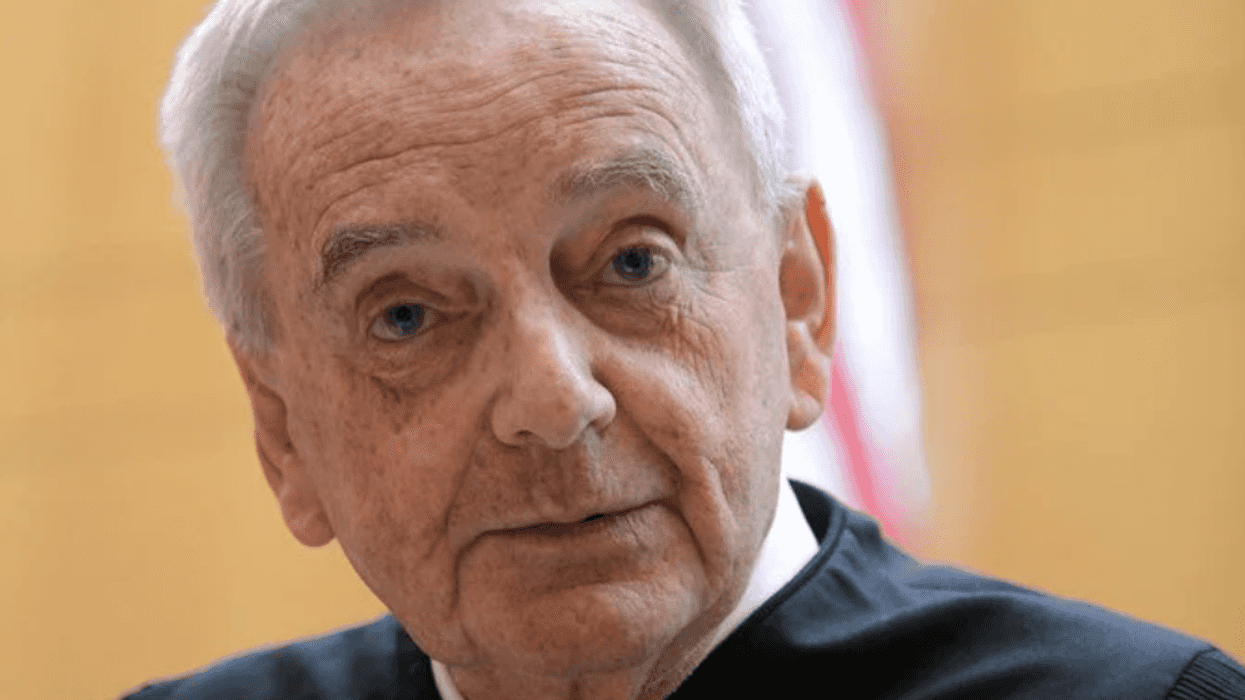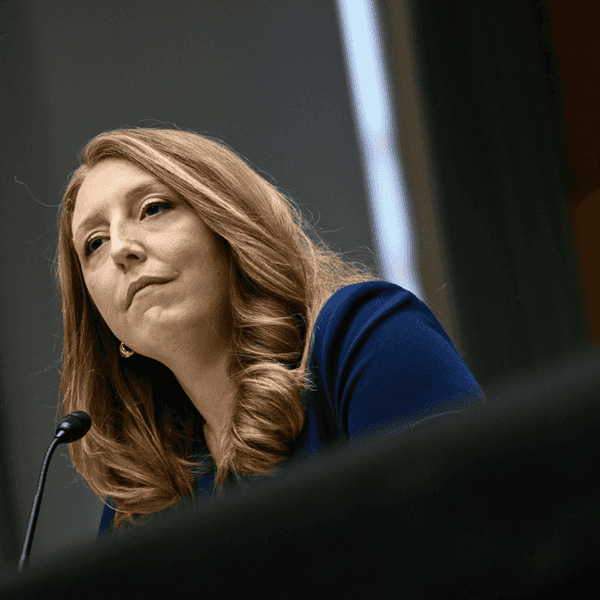Justice Department Rips Judge Cannon A New One With Appeal Brief

Judge Raymond Dearie
Judge Aileen Cannon may have thought she had granted the Department of Justice enough leeway to complete its investigation of Donald Trump for his mishandling and unsecure storage of classified documents at Mar a Lago, but in its appeal filed yesterday, the DOJ launched into a 29-page first-year-law lecture on the judge’s delusions about the law and her misunderstanding of the practicalities of conducting a national security investigation.
Cannon thought she was making two major concessions to the DOJ in her order issued on Thursday appointing Judge Raymond Dearie as special master. Previously she had told the DOJ it could not use the 100 folders of classified documents in their criminal investigation of Donald Trump. That order was specific and to the point. In her Thursday order, however, the judge told the DOJ that her previous order did not “restrict the Government from conducting investigations or bringing charges based on anything other than the actual content of the seized materials; from questioning witnesses and obtaining other information about the movement and storage of seized materials, including documents marked as classified, without discussion of their contents.”
This is what is usually called playing chicken with the government by those practicing before the bar. First, she tells the DOJ they can’t touch the classified documents or use them in any way whatsoever, even as they go about interviewing witnesses. Then she comes along and appears to reverse that restriction by allowing the DOJ to use the classified documents but not their contents. This is like telling a kid you can have your football back, but you can’t fill it with air and you can’t play with it.
The second concession she thought she was making was telling the special master that he was free to “prioritize” his review of the 11,000 documents, indicating that he could review the 100 classified documents first and then make “recommendations” to the judge as to how he thought the government could use them. The judge was depending on the DOJ and the special master to read-between-the-lines and conclude that her order was reasonable and go on with their business.
The DOJ is not satisfied with the judge’s so-called compromises and went straight at her order, calling it “unprecedented” because it enjoins “the Executive Branch’s use of its own highly classified records in a criminal investigation with direct implications for national security.” The DOJ thus makes two major points: First, the classified documents don’t belong to Trump, they belong to the federal government, and second, this is a national security investigation, and the government should be accorded the same deference and discretion that courts have always yielded to the branch of government that is charged by the Constitution with defending the country.
And that’s just the first sentence of the DOJ’s appeal.
The DOJ proceeds to deliver twenty-three more pages attacking Judge Cannon on her interpretation of the law, her misunderstanding of or refusal to concede various facts in evidence, and her abject deference to Trump, which apparently caused her to drop to her knees as she cited “the need to ensure at least the appearance of fairness and integrity under unprecedented circumstances.” The unprecedented circumstance she refers to is that Trump isn’t merely a common citizen, but a former president.
The DOJ’s position beforee the 11th Circuit, naturally, is that Trump is a citizen like any other, and while he should be accorded his rights under the law, he is not entitled to the special rights Cannon delivers to him on a silver platter in her order appointing the special master.
The DOJ makes no bones about pointing out that Judge Cannon appears to live on a legal planet occupied by exactly one person: herself. The entire purpose behind her order – the appointment of a special master to review the documents removed from the White House by Trump as to whether they are entitled to protection by attorney-client or executive privilege – is negated by the fact that neither privilege was ever asserted by Trump. The DOJ points out to the 11th Circuit that Judge Cannon appears to have claimed these privileges for Trump on her own, without input from the former president other than his original request that a special master be appointed for this purpose.
Talk about unprecedented! Only on Planet Cannon are federal judges entitled to claim executive privilege and attorney-client privilege for a plaintiff when neither privilege has been asserted.
The Nixon tapes decision by the Supreme Court established that even when a president or a former president asserts executive privilege over materials that he holds – in Nixon’s case, the White House tapes – such an assertion is “overcome by the government’s ‘demonstrated, specific need’ for them…because they are central to its ongoing investigation.”
That the “ongoing investigation” in both the Nixon and Trump cases was and is criminal in nature bears heavily on the rejection of the claim of either privilege, according to the DOJ appeal. The DOJ also points out that presidents cannot claim executive privilege over communications within the Executive Branch, only when such communications are sought by the Congress or by entities outside of the government. In this case, the DOJ reminded the Circuit Court, Trump is attempting to use the claim of executive privilege to prevent investigators who are part of the Executive Branch – the FBI and DOJ – from gaining access to materials which were classified by the Executive and owned by the Executive, from being used in a legitimate function of the Executive: a criminal investigation of the mishandling of national defense documents.
These are elements of law and procedure which should not have to be explained in an appeal to a Circuit Court, and yet here is the DOJ, in an echo of The Prime of Miss Jean Brody, having to do just that for a judge who -- like the title character in the play and film -- seems to have an unusual affection for authoritarian leaders, and particularly for Donald Trump.
The DOJ basically rehashes its argument that limiting the FBI’s access to and use of the 100 classified documents prevents the risk assessment by the Director of National Intelligence into whether or not the mishandling of national defense information by the former president has harmed the national defense. This is another case in which executive privilege cannot be claimed over documents owned by the government that are necessary to another part of the Executive Branch – the intelligence community – in carrying out its duties of helping to defend the nation.
The DOJ doubled down here in its appeal, pointing out that while Judge Cannon’s order may have appeared to allow the national security review of the classified documents to go forward, its limitations on the FBI blocked the assessment and thus damaged national security. The 100 classified documents “were stored in an unsecure manner over a prolonged period, and the court’s injunction itself prevents the government from even beginning to take necessary steps to determine whether improper disclosures might have occurred or may still occur.” By blocking the FBI from using the contents of the documents while interviewing witnesses and from analyzing the contents of the documents, the FBI is constrained from assisting the Director of National Intelligence in proceeding with the national security review.
Then the DOJ revealed a new wrinkle in its argument. The appeal claimed that the judge’s restrictions on the FBI’s use of the classified documents made it impossible to determine if any classified documents were still missing. The DOJ cited the 48 empty folders found at Mar a Lago with classification markings and told the Circuit Court that the judge’s order forbidding the FBI from using the contents of the classified documents prevented the government from identifying patterns in the documents Trump kept at Mar a Lago that might help determine the nature or even the specific names of the documents missing from the 48 empty folders.
In other words, the DOJ in its appeal to the 11th Circuit is coming close to accusing Trump of withholding secret documents in an attempt to thwart the government’s criminal investigation. The appeal strongly indicates that the DOJ believes some of the secret documents are missing from the folders because Trump has done something with them beyond hiding them, which would be included in the government’s national security assessment of harm caused by the fact that so many documents appear to be missing as well as by the mishandling of the seized documents themselves.
The DOJ goes into great detail describing Trump’s denials that he had even removed documents from the White House, and then his attempts to delay their return to the National Archives, including his incomplete response to a subpoena for the documents in which he had one of his lawyers certify that no more classified documents were being stored at Mar a Lago on June 3. The FBI search of Trump’s resort/club/residence in August turned up some 23 additional boxes of unreported material, including the 100 folders of classified documents the DOJ wants the appeals court to order released from Judge Cannon’s stay.
The bulk of the rest of the DOJ appeal goes into the legal issues involved and how Judge Cannon either ignored them or outright violated precedents and procedures. Lots of invocations of Rule 41(g) which requires that a plaintiff must show that “he had a possessory interest in the property seized by the government.” The DOJ takes pains to show Trump did not have any claim on the materials as much of the property and all of the classified documents seized by the FBI belong to the government under the Presidential Records Act and several other statutes regarding the handling of classified materials.
The DOJ includes a lengthy primer on how Trump cannot claim ownership of classified documents, nor can he claim executive privilege with respect to them, and lists a series of court decisions setting forth why executive privilege is qualified, not absolute. This primer was included in the DOJ’s last filing but obviously ignored by Judge Cannon wearing her “Miss Jean Brodie” robes as she found for Trump and against the government on every issue cited by the DOJ once again, this time with emphasis added.
Trump’s claim that he declassified the documents in question – which he made publicly but was never formally included in any of his filings to Judge Cannon – is dismissed by the government with a tsunami of details about what must be done to declassify documents, none of which Trump ever carried out. In fact, the DOJ asserts, there would be no contest over the contents of the classified documents if Trump had indeed declassified them, because at that point the contents could be made public and would not be subject to any restrictions placed by the judge on the documents. The entire matter would be moot.
What the whole thing boils down to in everything Judge Cannon has done to restrict the governments actions with regard to the classified documents, up to and including the appointment of a special master, is that she is all tingly and hot over one issue: the DOJ is engaged in a criminal investigation of the former president, and she doesn’t like it, so she has done her best to stop it.
Leaving aside all the legal twists and turns in the DOJ’s appeal, in plain English there is no possible claim of privilege, there is no issue over usage of contents, and no restrictions any judge could reasonably impose within the strictures of the law, because there is no case.
Lucian K. Truscott IV, a graduate of West Point, has had a 50-year career as a journalist, novelist, and screenwriter. He has covered Watergate, the Stonewall riots, and wars in Lebanon, Iraq, and Afghanistan. He is also the author of five bestselling novels. You can subscribe to his daily columns at luciantruscott.substack.com and follow him on Twitter @LucianKTruscott and on Facebook at Lucian K. Truscott IV.
Reprinted with permission from Lucian Truscott Newsletter








